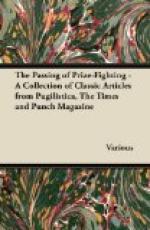It may be said that the stomach is a single organ, and therefore incapable of performing more than one function. As well might it be asserted that it was a steam-engine, with a single furnace consuming Whitehaven, Scotch, or Newcastle coals indiscriminately. The fact is, the stomach is not a single organ, but in reality a congeries of organs, each receiving its own proper kind of aliment, and developing itself by outward bumps and prominences, which indicate with amazing accuracy the existence of the particular faculty to which it has been assigned.
It is upon these facts that I have founded my system of Stomachology; and contemplating what has been done, what is doing, and what is likely to be done, in the analogous science of phrenology, I do not despair of seeing the human body mapped out, and marked all over with faculties, feelings, propensities, and powers, like a tattooed New Zealander. The study of anatomy will then be entirely superseded, and the scientific world would be guided, as the fashionable world is now, entirely by externals.
The circumstances which led me to the discovery of this important constitution of the stomach were partly accidental, and partly owing to my own intuitive sagacity. I had long observed that Judy, “my soul’s far dearer part,” entertained a decided partiality for a leg of pork and pease-pudding—to which I have a positive dislike. On extending my observations, I found that different individuals were characterised by different tastes in food, and that one man liked mint sauce with his roast lamb, while others detested it. I discovered also that in most persons there is a predominance of some particular organ over the surrounding ones, in which case a corresponding




